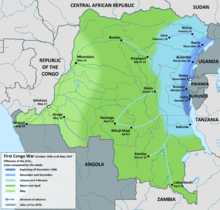First Congo War
| First Congo War | |||||||
|---|---|---|---|---|---|---|---|
| Part of the and the aftermath of the Rwandan Genocide | |||||||
 Map showing the AFDL offensive |
|||||||
|
|||||||
| Belligerents | |||||||
|
|
|
||||||
| Commanders and leaders | |||||||
|
|
|
||||||
| Strength | |||||||
|
Zaire: 50,000 – 60,000 Interahamwe: 40,000 – 100,000 total UNITA: c.1,000 |
AFDL: 57,000 Rwanda: 3,500 |
||||||
| Casualties and losses | |||||||
| 10,000–15,000 killed thousands surrender |
3,000–5,000 killed | ||||||
| 250,000–800,000 dead 222,000 refugees missing |
|||||||
The First Congo War (1996–1997) was a foreign invasion of Zaire led by Rwanda that replaced dictator Mobutu Sésé Seko with the rebel leader Laurent-Désiré Kabila. Destabilization in eastern Zaire resulting from the Rwandan Genocide was the final factor that caused numerous internal and external factors to align against the corrupt and inept government in the capital, Kinshasa.
The new government renamed the country to the Democratic Republic of the Congo, but it brought little true change. Kabila alienated his Rwandan and Ugandan allies. To avert a coup, Kabila expelled all Rwandan and Ugandan forces from the Congo. This event was a major cause of the Second Congo War the following year. Some experts prefer to view the two conflicts as one war.
An ethnic Ngbandi, Mobutu came to power in 1965 and enjoyed support from the United States government because of his anti-communist stance while in office. However, Mobutu's authoritarian rule and policies allowed the Zairian state to decay, evidenced by a 65% decrease in Zairian GDP between independence in 1960 and the end of Mobutu's rule in 1997. Following the end of the Cold War circa 1991, the United States stopped supporting Mobutu in favour of what it called a "new generation of African leaders", including Rwanda's Kagame and Uganda's Museveni.
A wave of democratisation swept across Africa during the 1990s. Under substantial internal and external pressure for a democratic transition in Zaire, Mobutu promised reform. He officially ended the one-party system he had maintained since 1967, but ultimately proved unwilling to implement broad reform, alienating allies both at home and abroad. In fact, the Zairian state had all but ceased to exist. The majority of the Zairian population relied on an informal economy for their subsistence, since the official economy was not reliable. Furthermore, the Zairian national army, Forces Armées Zaïroises (FAZ), was forced to prey upon the population for survival; Mobutu himself allegedly once asked FAZ soldiers why they needed pay when they had weapons.
...
Wikipedia
